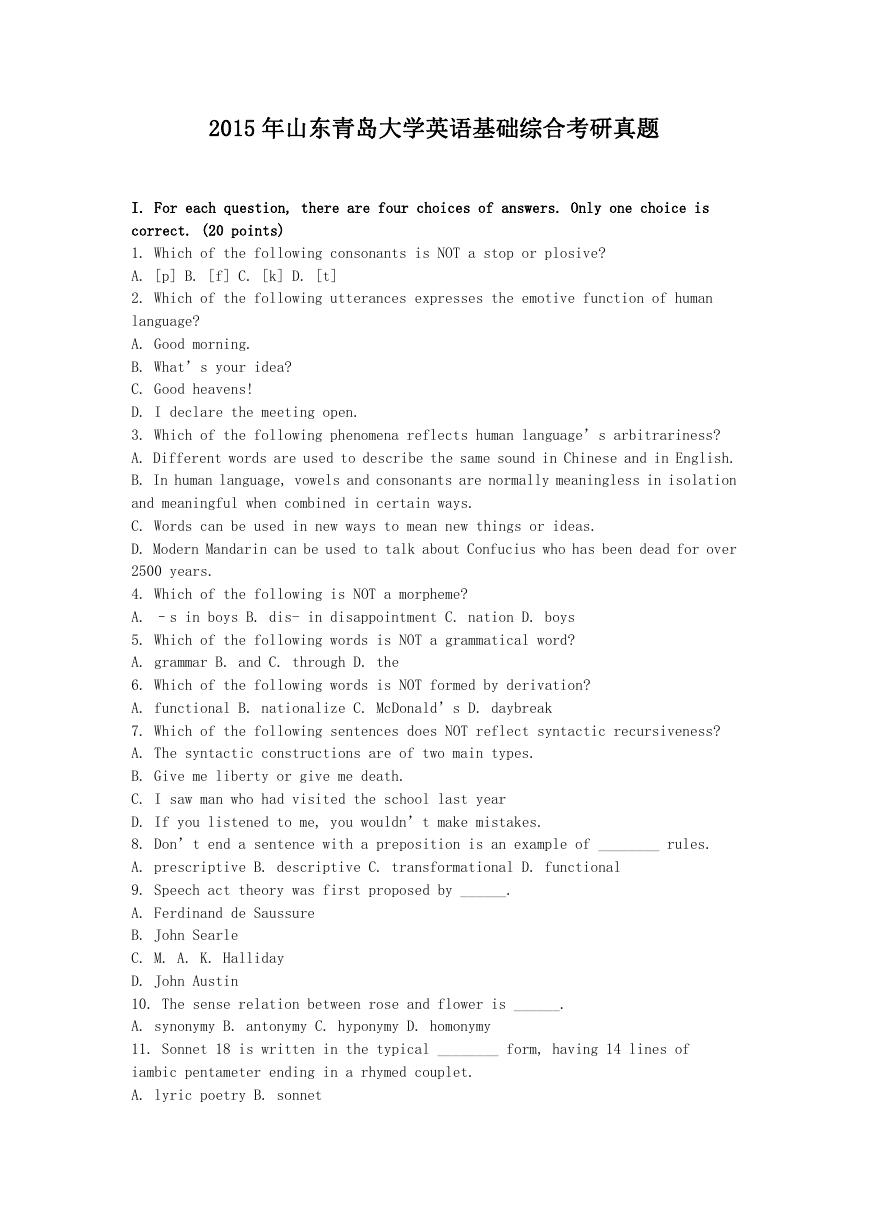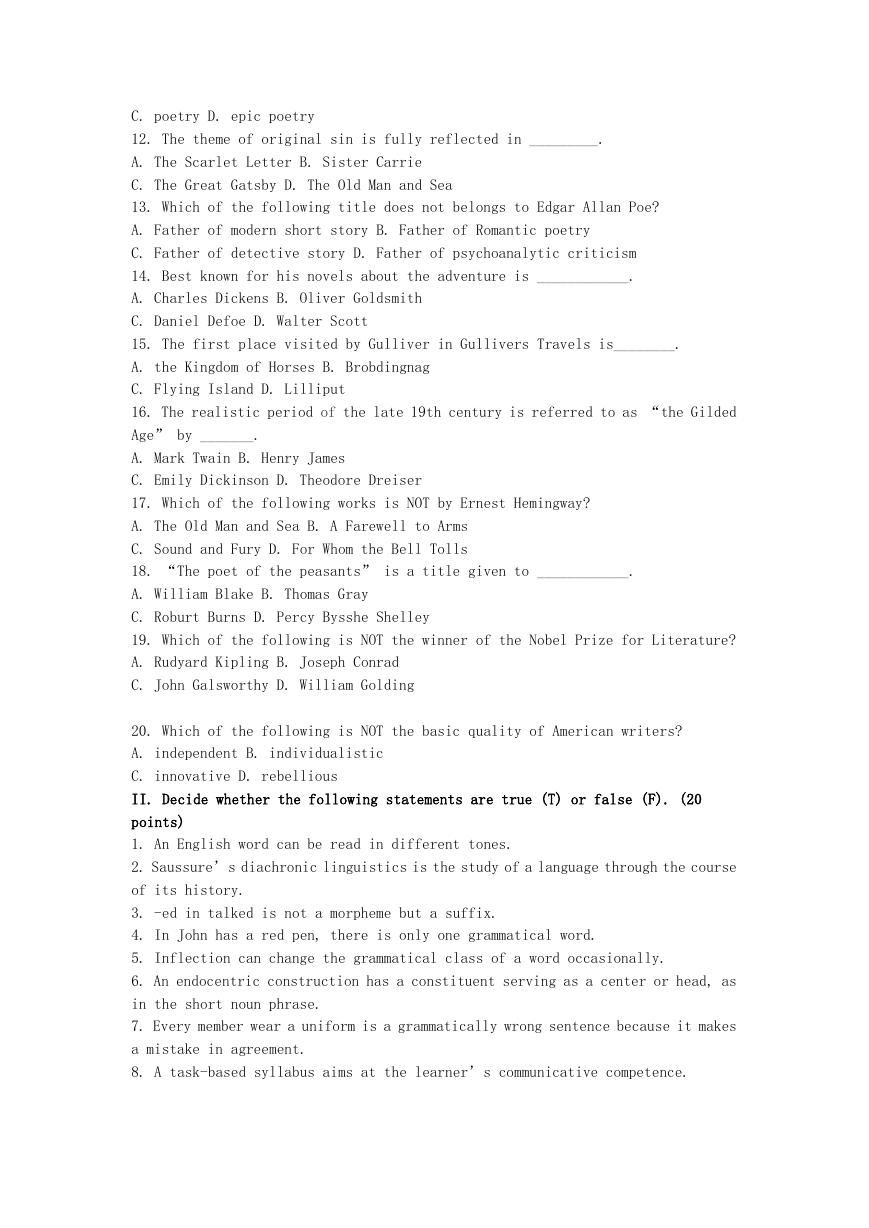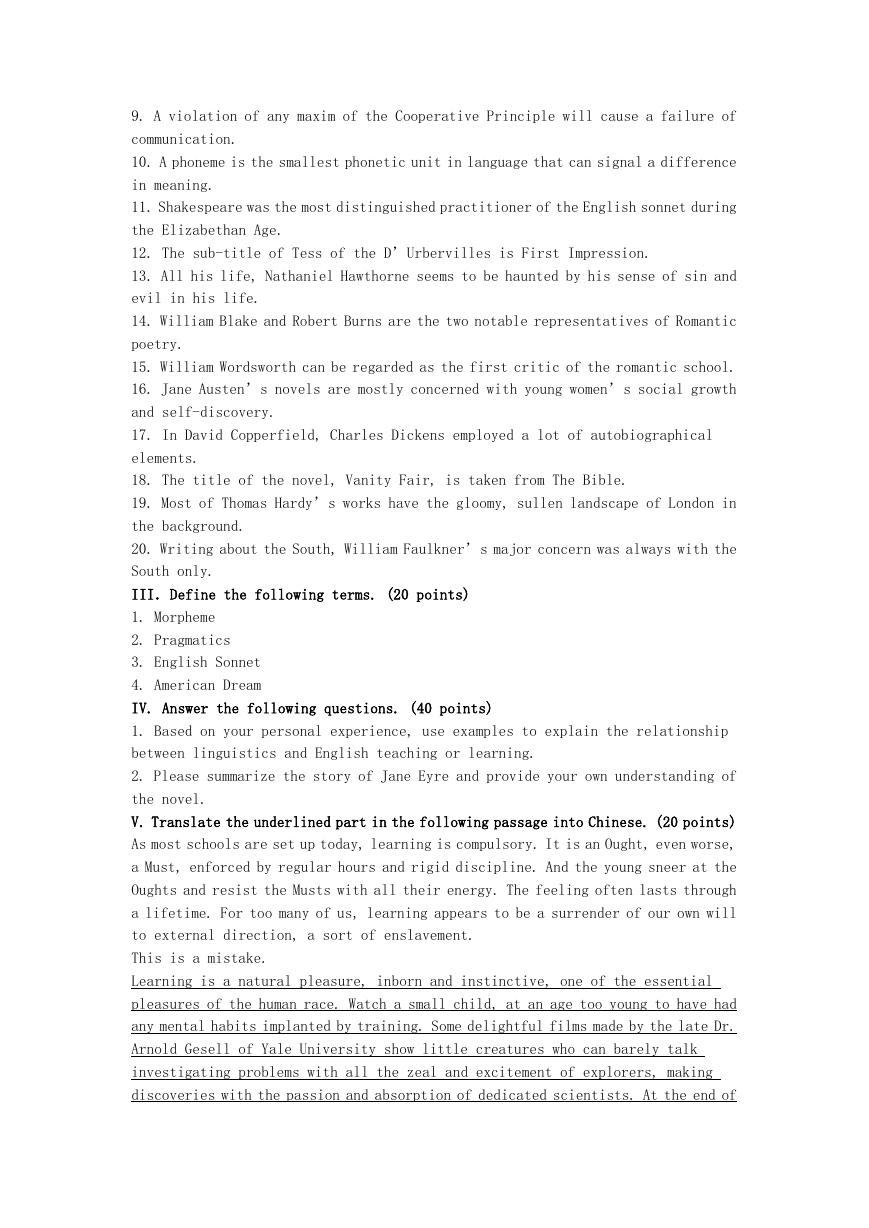2015 年山东青岛大学英语基础综合考研真题
I. For each question, there are four choices of answers. Only one choice is
correct. (20 points)
1. Which of the following consonants is NOT a stop or plosive?
A. [p] B. [f] C. [k] D. [t]
2. Which of the following utterances expresses the emotive function of human
language?
A. Good morning.
B. What’s your idea?
C. Good heavens!
D. I declare the meeting open.
3. Which of the following phenomena reflects human language’s arbitrariness?
A. Different words are used to describe the same sound in Chinese and in English.
B. In human language, vowels and consonants are normally meaningless in isolation
and meaningful when combined in certain ways.
C. Words can be used in new ways to mean new things or ideas.
D. Modern Mandarin can be used to talk about Confucius who has been dead for over
2500 years.
4. Which of the following is NOT a morpheme?
A. –s in boys B. dis- in disappointment C. nation D. boys
5. Which of the following words is NOT a grammatical word?
A. grammar B. and C. through D. the
6. Which of the following words is NOT formed by derivation?
A. functional B. nationalize C. McDonald’s D. daybreak
7. Which of the following sentences does NOT reflect syntactic recursiveness?
A. The syntactic constructions are of two main types.
B. Give me liberty or give me death.
C. I saw man who had visited the school last year
D. If you listened to me, you wouldn’t make mistakes.
8. Don’t end a sentence with a preposition is an example of ________ rules.
A. prescriptive B. descriptive C. transformational D. functional
9. Speech act theory was first proposed by ______.
A. Ferdinand de Saussure
B. John Searle
C. M. A. K. Halliday
D. John Austin
10. The sense relation between rose and flower is ______.
A. synonymy B. antonymy C. hyponymy D. homonymy
11. Sonnet 18 is written in the typical ________ form, having 14 lines of
iambic pentameter ending in a rhymed couplet.
A. lyric poetry B. sonnet
�
C. poetry D. epic poetry
12. The theme of original sin is fully reflected in _________.
A. The Scarlet Letter B. Sister Carrie
C. The Great Gatsby D. The Old Man and Sea
13. Which of the following title does not belongs to Edgar Allan Poe?
A. Father of modern short story B. Father of Romantic poetry
C. Father of detective story D. Father of psychoanalytic criticism
14. Best known for his novels about the adventure is ____________.
A. Charles Dickens B. Oliver Goldsmith
C. Daniel Defoe D. Walter Scott
15. The first place visited by Gulliver in Gullivers Travels is________.
A. the Kingdom of Horses B. Brobdingnag
C. Flying Island D. Lilliput
16. The realistic period of the late 19th century is referred to as “the Gilded
Age” by _______.
A. Mark Twain B. Henry James
C. Emily Dickinson D. Theodore Dreiser
17. Which of the following works is NOT by Ernest Hemingway?
A. The Old Man and Sea B. A Farewell to Arms
C. Sound and Fury D. For Whom the Bell Tolls
18. “The poet of the peasants” is a title given to ____________.
A. William Blake B. Thomas Gray
C. Roburt Burns D. Percy Bysshe Shelley
19. Which of the following is NOT the winner of the Nobel Prize for Literature?
A. Rudyard Kipling B. Joseph Conrad
C. John Galsworthy D. William Golding
20. Which of the following is NOT the basic quality of American writers?
A. independent B. individualistic
C. innovative D. rebellious
II. Decide whether the following statements are true (T) or false (F). (20
points)
1. An English word can be read in different tones.
2. Saussure’s diachronic linguistics is the study of a language through the course
of its history.
3. -ed in talked is not a morpheme but a suffix.
4. In John has a red pen, there is only one grammatical word.
5. Inflection can change the grammatical class of a word occasionally.
6. An endocentric construction has a constituent serving as a center or head, as
in the short noun phrase.
7. Every member wear a uniform is a grammatically wrong sentence because it makes
a mistake in agreement.
8. A task-based syllabus aims at the learner’s communicative competence.
�
9. A violation of any maxim of the Cooperative Principle will cause a failure of
communication.
10. A phoneme is the smallest phonetic unit in language that can signal a difference
in meaning.
11. Shakespeare was the most distinguished practitioner of the English sonnet during
the Elizabethan Age.
12. The sub-title of Tess of the D’Urbervilles is First Impression.
13. All his life, Nathaniel Hawthorne seems to be haunted by his sense of sin and
evil in his life.
14. William Blake and Robert Burns are the two notable representatives of Romantic
poetry.
15. William Wordsworth can be regarded as the first critic of the romantic school.
16. Jane Austen’s novels are mostly concerned with young women’s social growth
and self-discovery.
17. In David Copperfield, Charles Dickens employed a lot of autobiographical
elements.
18. The title of the novel, Vanity Fair, is taken from The Bible.
19. Most of Thomas Hardy’s works have the gloomy, sullen landscape of London in
the background.
20. Writing about the South, William Faulkner’s major concern was always with the
South only.
III.Define the following terms. (20 points)
1. Morpheme
2. Pragmatics
3. English Sonnet
4. American Dream
IV. Answer the following questions. (40 points)
1. Based on your personal experience, use examples to explain the relationship
between linguistics and English teaching or learning.
2. Please summarize the story of Jane Eyre and provide your own understanding of
the novel.
V. Translate the underlined part in the following passage into Chinese. (20 points)
As most schools are set up today, learning is compulsory. It is an Ought, even worse,
a Must, enforced by regular hours and rigid discipline. And the young sneer at the
Oughts and resist the Musts with all their energy. The feeling often lasts through
a lifetime. For too many of us, learning appears to be a surrender of our own will
to external direction, a sort of enslavement.
This is a mistake.
Learning is a natural pleasure, inborn and instinctive, one of the essential
pleasures of the human race. Watch a small child, at an age too young to have had
any mental habits implanted by training. Some delightful films made by the late Dr.
Arnold Gesell of Yale University show little creatures who can barely talk
investigating problems with all the zeal and excitement of explorers, making
discoveries with the passion and absorption of dedicated scientists. At the end of
�
each successful investigation, there comes over each tiny face an expression of pure
heart-felt pleasure.
When Archimedes discovered the principle of specific gravity by observing his own
displacement of water in a bathtub, he leaped out with delight, shouting, “Eureka,
Eureka!” (“I have found it, I have found it!”) The instinct which prompted his
outburst, and the joy of its gratification, are possessed by all children.
VI. Composition (30 points)
Please write a composition of at least 500 words with the title of “What Makes a
Good Teacher?”
�








 2023年江西萍乡中考道德与法治真题及答案.doc
2023年江西萍乡中考道德与法治真题及答案.doc 2012年重庆南川中考生物真题及答案.doc
2012年重庆南川中考生物真题及答案.doc 2013年江西师范大学地理学综合及文艺理论基础考研真题.doc
2013年江西师范大学地理学综合及文艺理论基础考研真题.doc 2020年四川甘孜小升初语文真题及答案I卷.doc
2020年四川甘孜小升初语文真题及答案I卷.doc 2020年注册岩土工程师专业基础考试真题及答案.doc
2020年注册岩土工程师专业基础考试真题及答案.doc 2023-2024学年福建省厦门市九年级上学期数学月考试题及答案.doc
2023-2024学年福建省厦门市九年级上学期数学月考试题及答案.doc 2021-2022学年辽宁省沈阳市大东区九年级上学期语文期末试题及答案.doc
2021-2022学年辽宁省沈阳市大东区九年级上学期语文期末试题及答案.doc 2022-2023学年北京东城区初三第一学期物理期末试卷及答案.doc
2022-2023学年北京东城区初三第一学期物理期末试卷及答案.doc 2018上半年江西教师资格初中地理学科知识与教学能力真题及答案.doc
2018上半年江西教师资格初中地理学科知识与教学能力真题及答案.doc 2012年河北国家公务员申论考试真题及答案-省级.doc
2012年河北国家公务员申论考试真题及答案-省级.doc 2020-2021学年江苏省扬州市江都区邵樊片九年级上学期数学第一次质量检测试题及答案.doc
2020-2021学年江苏省扬州市江都区邵樊片九年级上学期数学第一次质量检测试题及答案.doc 2022下半年黑龙江教师资格证中学综合素质真题及答案.doc
2022下半年黑龙江教师资格证中学综合素质真题及答案.doc